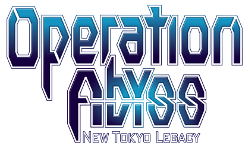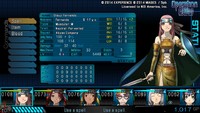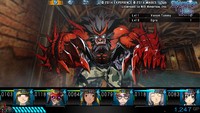|
|

|
PLATFORM
|
Vita
|
BATTLE SYSTEM
|

|
INTERACTION
|

|
ORIGINALITY
|

|
STORY
|

|
MUSIC & SOUND
|

|
VISUALS
|

|
CHALLENGE
|
Moderate
|
COMPLETION TIME
|
40-60 Hours
|
|
OVERALL

|
+ Quick battles
+ Solid localization
- Uninteresting story
- Little direction in dungeons
- Mostly useless item drops
|
Click here for scoring definitions
|
|
|
Operation Abyss: New Tokyo Legacy is a first person dungeon crawler published by NIS America from the same developer that brought us Demon Gaze. Going into the game, I was expecting blazing fast battles, lots of loot, and a quirky story. However, the tone of the game is a fair bit darker and more serious than its predecessor and not necessarily for the better.
Taking place in a future Tokyo, the story involves a group of exceptional teenagers with an ability called Code Rise that allows them to fight creatures known as Variants. They are recruited into an organization known as the CPA and join a squad called the Xth. Code Rise abilities are only found in teenagers, and the power typically fades as they get older until it is gone completely. There are several organizations, shady or benign, that are working all around the Xth, and it's up to the squad to get to the bottom of a handful of mysteries.
The plot plays out in missions that send the party into dungeons known as Abysses. Generally, there is a briefing detailing the whys and very little else other than a vague clue as to what is happening or what needs to be done. The story is generally pretty sparse in dungeons, occurring usually upon reaching the end. Since the party is made up of silent, customizable characters, all the plot revolves around the team's companions and enemies, and few of them are ever developed enough to create an interesting personality.
The biggest failing in the story is that every character is exactly what they seem. Bad guys are written to make it obvious that they are villains, and good guys are always equally obvious. The one interesting major plot twist plays out like a complete cliché, ruining a decent set-up that deserved better. There are emotional scenes that fail completely due to players being given no reason to care about the people involved in the drama.
 Automatic names gives weird combinations.
Automatic names gives weird combinations.
|
|
Similarly to Demon Gaze, the battles are turn based and combat moves forward at a speed based entirely on how quickly players want to press the X button. The first three characters in the team are the front line, the last three are the back line. Weapons have ranges, so short ranged weapons can't hit anything from the back row and long ranged weapons can hit any row. Enemies follow the same rules for ranges, so there are many times the bulk of baddies won't actually do anything unless they're in the front row.
Every level gives one point to add to a character's stats, though occasionally a bonus second point is awarded to that same stat. Players can change to Blood, which sends the character back to level one. Doing this does allow the characters to keep their stat growths, however, further ones are not awarded again until that Blood goes past the level previously obtained on another Blood, meaning players can't simply keep resetting classes to create a super-build. Skills are also reset when changing Bloods, meaning no cross-classing, so this makes switching them a generally useless endeavour unless there is specific need for another Blood's innate ability. While there is a wide variety in Blood classes, some are effectively essential for traversing the dungeons and so they will likely eat a spot on the team which limits the options a bit.
Every level gives one point to add to a character's stats, though occasionally Bloods will gain extra stats that are added as well. Each stat bonus point can only be obtained once for each level, no matter how many different Bloods are levelled up, and there are no cross class skills which makes switching Bloods relatively useless unless there is a need for the abilities a different Blood can provide. While there is a wide variety, some classes are almost essential for traversing the dungeons and so they will likely take a spot on the team which limits options a bit.
Operation Abyss has a very straightforward item crafting system, which is easy to use and necessary to keep characters geared up for battle. There is also the option to boost items' power by upgrading their level, the maximum of which depends on the item itself, as well as the option to affix elemental or enemy specific properties, which can aid in damaging otherwise resistant variants. This is the most effective way of increasing a party member's defense or to damage certain types of enemies. While affixing items can be mostly ignored without hindering progress, equipment will need to be upgraded or the party will find themselves unable to survive against the stronger foes.
 This ogre is definitely not an onion.
This ogre is definitely not an onion.
|
|
The store has very little in terms of what can be bought, and a lot of the items are limited in how much can be bought in total, so almost every piece of equipment will come from enemy drops and item creation. Equipment drops are typically lower level than the enemies being fought, with instances of level ten to fifteen gear being dropped by level forty or higher enemies.
There is an encounter level gauge that increases with every completed battle and decreases if the party flees. This impacts subsequent battles, with enemy levels and encounter frequency increasing as the gauge goes up. It also affects bosses and scripted encounters, which can cause some issues if a party is unprepared and requires players to not just blindly engage with every opponent they come across.
Dungeons are populated with traps, warp zones, dark zones, damage panels and walls, deep water that needs a float spell or item to be crossed, locked doors with several different possible ways to unlock, one way corridors, and random encounters, fixed encounters, and event battles. There is very little direction given in the dungeons, so a lot of the time exploring the entire area is necessary. Lucky players will find notes dropped by others that explain where to go, what to do, or the order in which something must be completed to progress.
Audio wise, Operation Abyss is respectable, if mostly forgettable. None of the tracks are particularly mind blowing, but it's hard to come up with a serious complaint for the music. The dub is pretty solid with very little that will offend the senses of the standard gamer. The noises characters make when damaged are the exception, which also happens every time the party walks into a wall or any trap, as certain voices are very annoying when they repeatedly grunt or cry out and it gets old very quickly. Luckily there's an option to have no voice when creating a character.
It's hard to recommend Operation Abyss to anyone except hardcore dungeon crawler fans. The story just doesn't have the content for a game of this length, and dungeon design issues often make exploration and advancing a major annoyance. Burnout rates will be high, patience will be tested, and the payoff will likely leave players feeling a little sour. If one doesn't mind the grind of directionless dungeon crawling though, there's a lot of exploration to do and variants to kill.
Review Archives
|









